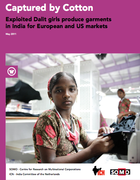Multinational clothing brands are sourcing from cotton spinning mills in Tamil Nadu that exploit teenage girls, subjecting them to what the ILO terms the ‘worst forms of child labour’.

The girls are not offered fair wages and work towards a promise of being paid a dowry (lump sum to help in getting married), made up of withheld wages, after three years employment. The scheme is called the ‘Sumangali Scheme’ and it is not uncommon that at the end of the three years the girls are not paid and have effectively been used as slaves. Even when the girl’s are paid, the wages are below the minimum wage and the working conditions so hazardous that many girls must use any money they make to pay for their medical bills.
These are some of the key findings in the report ‘Captured by Cotton’ released today by the India Committee of the Netherlands (ICN) and the Centre for Research on Multinational Corporations (SOMO).
The report states that about 60% of the girls exploited under the ‘Sumangali Scheme’ are Dalits. Because of rampant caste discrimination deeming Dalits polluted and ‘untouchable’, young Dalit girls are often so limited in their choice of occupation that they have no alternatives to accepting the conditions offered by the spinning mills and the recruiters also lure girls with false promises. These girls are often illiterate and therefore do not know what it is they are signing when signing a contract.
The girls are often forced to work very long hours and are not allowed to leave the factory premises or hostel. SOMO and ICN write in a press release that the situation including excessive overwork, restricted freedom of movement, lack of privacy, no possibility to lodge complaints, unsafe and unhealthy working conditions etc. fits the definition of ‘worst forms of child labour’ as laid out by the International Labour Organisation (ILO).
The report includes a list of the multinational brands sourcing from the spinning mills who use or have used the Sumangali Scheme, features interviews with girls who have worked under this scheme and descriptions of the terrible labour conditions in the mills.
Read the full ICN/ SOMO report ‘Captured by Cotton’
See IDSN’s section on caste discrimination and business and CSR
